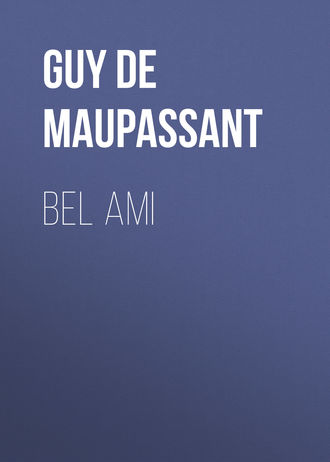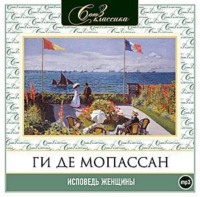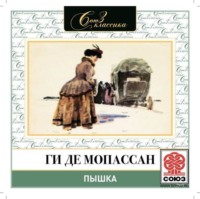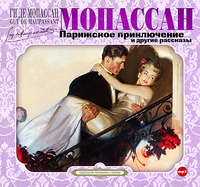 полная версия
полная версияBel Ami
Mother Duroy did not speak, but remained sad and grim, watching her daughter-in-law out of the corner of her eye, with hatred awakened in her heart – the hatred of an old toiler, an old rustic with fingers worn and limbs bent by hard work – for the city madame, who inspired her with the repulsion of an accursed creature, an impure being, created for idleness and sin. She kept getting up every moment to fetch the dishes or fill the glasses with cider, sharp and yellow from the decanter, or sweet, red, and frothing from the bottles, the corks of which popped like those of ginger beer.
Madeleine scarcely ate or spoke. She wore her wonted smile upon her lips, but it was a sad and resigned one. She was downcast. Why? She had wanted to come. She had not been unaware that she was going among country folk – poor country folk. What had she fancied them to be – she, who did not usually dream? Did she know herself? Do not women always hope for something that is not? Had she fancied them more poetical? No; but perhaps better informed, more noble, more affectionate, more ornamental. Yet she did not want them high-bred, like those in novels. Whence came it, then, that they shocked her by a thousand trifling, imperceptible details, by a thousand indefinable coarsenesses, by their very nature as rustics, by their words, their gestures, and their mirth? She recalled her own mother, of whom she never spoke to anyone – a governess, brought up at Saint Denis – seduced, and died from poverty and grief when she, Madeleine, was twelve years old. An unknown hand had had her brought up. Her father, no doubt. Who was he? She did not exactly know, although she had vague suspicions.
The lunch still dragged on. Customers were now coming in and shaking hands with the father, uttering exclamations of wonderment on seeing his son, and slyly winking as they scanned the young wife out of the corner of their eye, which was as much as to say: "Hang it all, she's not a duffer, George Duroy's wife." Others, less intimate, sat down at the wooden tables, calling for "A pot," "A jugful," "Two brandies," "A raspail," and began to play at dominoes, noisily rattling the little bits of black and white bone. Mother Duroy kept passing to and fro, serving the customers, with her melancholy air, taking money, and wiping the tables with the corner of her blue apron.
The smoke of clay pipes and sou cigars filled the room. Madeleine began to cough, and said: "Suppose we go out; I cannot stand it."
They had not quite finished, and old Duroy was annoyed at this. Then she got up and went and sat on a chair outside the door, while her father-in-law and her husband were finishing their coffee and their nip of brandy.
George soon rejoined her. "Shall we stroll down as far as the Seine?" said he.
She consented with pleasure, saying: "Oh, yes; let us go."
They descended the slope, hired a boat at Croisset, and passed the rest of the afternoon drowsily moored under the willows alongside an island, soothed to slumber by the soft spring weather, and rocked by the wavelets of the river. Then they went back at nightfall.
The evening's repast, eaten by the light of a tallow candle, was still more painful for Madeleine than that of the morning. Father Duroy, who was half drunk, no longer spoke. The mother maintained her dogged manner. The wretched light cast upon the gray walls the shadows of heads with enormous noses and exaggerated movements. A great hand was seen to raise a pitchfork to a mouth opening like a dragon's maw whenever any one of them, turning a little, presented a profile to the yellow, flickering flame.
As soon as dinner was over, Madeleine drew her husband out of the house, in order not to stay in this gloomy room, always reeking with an acrid smell of old pipes and spilt liquor. As soon as they were outside, he said: "You are tired of it already."
She began to protest, but he stopped her, saying: "No, I saw it very plainly. If you like, we will leave to-morrow."
"Very well," she murmured.
They strolled gently onward. It was a mild night, the deep, all-embracing shadow of which seemed filled with faint murmurings, rustlings, and breathings. They had entered a narrow path, overshadowed by tall trees, and running between two belts of underwood of impenetrable blackness.
"Where are we?" asked she.
"In the forest," he replied.
"Is it a large one?"
"Very large; one of the largest in France."
An odor of earth, trees, and moss – that fresh yet old scent of the woods, made up of the sap of bursting buds and the dead and moldering foliage of the thickets, seemed to linger in the path. Raising her head, Madeleine could see the stars through the tree-tops; and although no breeze stirred the boughs, she could yet feel around her the vague quivering of this ocean of leaves. A strange thrill shot through her soul and fleeted across her skin – a strange pain gripped her at the heart. Why, she did not understand. But it seemed to her that she was lost, engulfed, surrounded by perils, abandoned by everyone; alone, alone in the world beneath this living vault quivering there above her.
She murmured: "I am rather frightened. I should like to go back."
"Well, let us do so."
"And – we will leave for Paris to-morrow?"
"Yes, to-morrow."
"To-morrow morning?"
"To-morrow morning, if you like."
They returned home. The old folks had gone to bed. She slept badly, continually aroused by all the country sounds so new to her – the cry of the screech owl, the grunting of a pig in a sty adjoining the house, and the noise of a cock who kept on crowing from midnight. She was up and ready to start at daybreak.
When George announced to his parents that he was going back they were both astonished; then they understood the origin of his wish.
The father merely said: "Shall I see you again soon?"
"Yes, in the course of the summer."
"So much the better."
The old woman growled: "I hope you won't regret what you have done."
He left them two hundred francs as a present to assuage their discontent, and the carriage, which a boy had been sent in quest of, having made its appearance at about ten o'clock, the newly-married couple embraced the old country folk and started off once more.
As they were descending the hill Duroy began to laugh.
"There," he said, "I had warned you. I ought not to have introduced you to Monsieur and Madame du Roy de Cantel, Senior."
She began to laugh, too, and replied: "I am delighted now. They are good folk, whom I am beginning to like very well. I will send them some presents from Paris." Then she murmured: "Du Roy de Cantel, you will see that no one will be astonished at the terms of the notification of our marriage. We will say that we have been staying for a week with your parents on their estate." And bending towards him she kissed the tip of his moustache, saying: "Good morning, George."
He replied: "Good morning, Made," as he passed an arm around her waist.
In the valley below they could see the broad river like a ribbon of silver unrolled beneath the morning sun, the factory chimneys belching forth their clouds of smoke into the sky, and the pointed spires rising above the old town.
X
The Du Roys had been back in Paris a couple of days, and the journalist had taken up his old work pending the moment when he should definitely assume Forestier's duties, and give himself wholly up to politics. He was going home that evening to his predecessor's abode to dinner, with a light heart and a keen desire to embrace his wife, whose physical attractions and imperceptible domination exercised a powerful impulse over him. Passing by a florist's at the bottom of the Rue Notre Dame de Lorette, he was struck by the notion of buying a bouquet for Madeleine, and chose a large bunch of half-open roses, a very bundle of perfumed buds.
At each story of his new staircase he eyed himself complacently in the mirrors, the sight of which continually recalled to him his first visit to the house. He rang the bell, having forgotten his key, and the same man-servant, whom he had also kept on by his wife's advice, opened the door.
"Has your mistress come home?" asked George.
"Yes, sir."
But on passing through the dining-room he was greatly surprised to find the table laid for three, and the hangings of the drawing-room door being looped up, saw Madeleine arranging in a vase on the mantelpiece a bunch of roses exactly similar to his own. He was vexed and displeased; it was as though he had been robbed of his idea, his mark of attention, and all the pleasure he anticipated from it.
"You have invited some one to dinner, then?" he inquired, as he entered the room.
She answered without turning round, and while continuing to arrange the flowers: "Yes, and no. It is my old friend, the Count de Vaudrec, who has been accustomed to dine here every Monday, and who has come as usual."
George murmured: "Ah! very good."
He remained standing behind her, bouquet in hand, with a longing to hide it or throw it away. He said, however: "I have brought you some roses."
She turned round suddenly, smiling, and exclaimed: "Ah! how nice of you to have thought of that."
And she held out her arms and lips to him with an outburst of joy so real that he felt consoled. She took the flowers, smelt them, and with the liveliness of a delighted child, placed them in the vase that remained empty opposite the other. Then she murmured, as she viewed the result: "How glad I am. My mantelpiece is furnished now." She added almost immediately, in a tone of conviction: "You know Vaudrec is awfully nice; you will be friends with him at once."
A ring announced the Count. He entered quietly, and quite at his ease, as though at home. After having gallantly kissed the young wife's fingers, he turned to the husband and cordially held out his hand, saying: "How goes it, my dear Du Roy?"
It was no longer his former stiff and starched bearing, but an affable one, showing that the situation was no longer the same. The journalist, surprised, strove to make himself agreeable in response to these advances. It might have been believed within five minutes that they had known and loved one another for ten years past.
Then Madeleine, whose face was radiant, said: "I will leave you together, I must give a look to my dinner." And she went out, followed by a glance from both men. When she returned she found them talking theatricals apropos of a new piece, and so thoroughly of the same opinion that a species of rapid friendship awoke in their eyes at the discovery of this absolute identity of ideas.
The dinner was delightful, so intimate and cordial, and the Count stayed on quite late, so comfortable did he feel in this nice little new household.
As soon as he had left Madeleine said to her husband: "Is he not perfect? He gains in every way by being known. He is a true friend – safe, devoted, faithful. Ah, without him – "
She did not finish the sentence, and George replied: "Yes, I find him very agreeable. I think that we shall get on very well together."
She resumed: "You do not know, but we have some work to do together before going to bed. I had not time to speak to you about it before dinner, because Vaudrec came in at once. I have had some important news, news from Morocco. It was Laroche-Mathieu, the deputy, the future minister, who brought it to me. We must work up an important article, a sensational one. I have the facts and figures. We will set to work at once. Bring the lamp."
He took it, and they passed into the study. The same books were ranged in the bookcase, which now bore on its summit the three vases bought at the Golfe Juan by Forestier on the eve of his death. Under the table the dead man's mat awaited the feet of Du Roy, who, on sitting down, took up an ivory penholder slightly gnawed at the end by the other's teeth. Madeleine leant against the mantelpiece, and having lit a cigarette related her news, and then explained her notions and the plan of the article she meditated. He listened attentively, scribbling notes as he did so, and when she had finished, raised objections, took up the question again, enlarged its bearing, and sketched in turn, not the plan of an article, but of a campaign against the existing Ministry. This attack would be its commencement. His wife had left off smoking, so strongly was her interest aroused, so vast was the vision that opened before her as she followed out George's train of thought.
She murmured, from time to time: "Yes, yes; that is very good. That is capital. That is very clever."
And when he had finished speaking in turn, she said: "Now let us write."
But he always found it hard to make a start, and with difficulty sought his expressions. Then she came gently, and, leaning over his shoulder, began to whisper sentences in his ear. From time to time she would hesitate, and ask: "Is that what you want to say?"
He answered: "Yes, exactly."
She had piercing shafts, the poisoned shafts of a woman, to wound the head of the Cabinet, and she blended jests about his face with others respecting his policy in a curious fashion, that made one laugh, and, at the same time, impressed one by their truth of observation.
Du Roy from time to time added a few lines which widened and strengthened the range of attack. He understood, too, the art of perfidious insinuation, which he had learned in sharpening up his "Echoes"; and when a fact put forward as certain by Madeleine appeared doubtful or compromising, he excelled in allowing it to be divined and in impressing it upon the mind more strongly than if he had affirmed it. When their article was finished, George read it aloud. They both thought it excellent, and smiled, delighted and surprised, as if they had just mutually revealed themselves to one another. They gazed into the depths of one another's eyes with yearnings of love and admiration, and they embraced one another with an ardor communicated from their minds to their bodies.
Du Roy took up the lamp again. "And now to bye-bye," said he, with a kindling glance.
She replied: "Go first, sir, since you light the way."
He went first, and she followed him into their bedroom, tickling his neck to make him go quicker, for he could not stand that.
The article appeared with the signature of George Duroy de Cantel, and caused a great sensation. There was an excitement about it in the Chamber. Daddy Walter congratulated the author, and entrusted him with the political editorship of the Vie Francaise. The "Echoes" fell again to Boisrenard.
Then there began in the paper a violent and cleverly conducted campaign against the Ministry. The attack, now ironical, now serious, now jesting, and now virulent, but always skillful and based on facts, was delivered with a certitude and continuity which astonished everyone. Other papers continually cited the Vie Francaise, taking whole passages from it, and those in office asked themselves whether they could not gag this unknown and inveterate foe with the gift of a prefecture.
Du Roy became a political celebrity. He felt his influence increasing by the pressure of hands and the lifting of hats. His wife, too, filled him with stupefaction and admiration by the ingenuity of her mind, the value of her information, and the number of her acquaintances. Continually he would find in his drawing-room, on returning home, a senator, a deputy, a magistrate, a general, who treated Madeleine as an old friend, with serious familiarity. Where had she met all these people? In society, so she said. But how had she been able to gain their confidence and their affection? He could not understand it.
"She would make a terrible diplomatist," he thought.
She often came in late at meal times, out of breath, flushed, quivering, and before even taking off her veil would say: "I have something good to-day. Fancy, the Minister of Justice has just appointed two magistrates who formed a part of the mixed commission. We will give him a dose he will not forget in a hurry."
And they would give the minister a dose, and another the next day, and a third the day after. The deputy, Laroche-Mathieu, who dined at the Rue Fontaine every Tuesday, after the Count de Vaudrec, who began the week, would shake the hands of husband and wife with demonstrations of extreme joy. He never ceased repeating: "By Jove, what a campaign! If we don't succeed after all?"
He hoped, indeed, to succeed in getting hold of the portfolio of foreign affairs, which he had had in view for a long time.
He was one of those many-faced politicians, without strong convictions, without great abilities, without boldness, and without any depth of knowledge, a provincial barrister, a local dandy, preserving a cunning balance between all parties, a species of Republican Jesuit and Liberal mushroom of uncertain character, such as spring up by hundreds on the popular dunghill of universal suffrage. His village machiavelism caused him to be reckoned able among his colleagues, among all the adventurers and abortions who are made deputies. He was sufficiently well-dressed, correct, familiar, and amiable to succeed. He had his successes in society, in the mixed, perturbed, and somewhat rough society of the high functionaries of the day. It was said everywhere of him: "Laroche will be a minister," and he believed more firmly than anyone else that he would be. He was one of the chief shareholders in Daddy Walter's paper, and his colleague and partner in many financial schemes.
Du Roy backed him up with confidence and with vague hopes as to the future. He was, besides, only continuing the work begun by Forestier, to whom Laroche-Mathieu had promised the Cross of the Legion of Honor when the day of triumph should come. The decoration would adorn the breast of Madeleine's second husband, that was all. Nothing was changed in the main.
It was seen so well that nothing was changed that Du Roy's comrades organized a joke against him, at which he was beginning to grow angry. They no longer called him anything but Forestier. As soon as he entered the office some one would call out: "I say, Forestier."
He would pretend not to hear, and would look for the letters in his pigeon-holes. The voice would resume in louder tones, "Hi! Forestier." Some stifled laughs would be heard, and as Du Roy was entering the manager's room, the comrade who had called out would stop him, saying: "Oh, I beg your pardon, it is you I want to speak to. It is stupid, but I am always mixing you up with poor Charles. It is because your articles are so infernally like his. Everyone is taken in by them."
Du Roy would not answer, but he was inwardly furious, and a sullen wrath sprang up in him against the dead man. Daddy Walter himself had declared, when astonishment was expressed at the flagrant similarity in style and inspiration between the leaders of the new political editor and his predecessor: "Yes, it is Forestier, but a fuller, stronger, more manly Forestier."
Another time Du Roy, opening by chance the cupboard in which the cup and balls were kept, had found all those of his predecessor with crape round the handles, and his own, the one he had made use of when he practiced under the direction of Saint-Potin, ornamented with a pink ribbon. All had been arranged on the same shelf according to size, and a card like those in museums bore the inscription: "The Forestier-Du Roy (late Forestier and Co.) Collection." He quietly closed the cupboard, saying, in tones loud enough to be heard: "There are fools and envious people everywhere."
But he was wounded in his pride, wounded in his vanity, that touchy pride and vanity of the writer, which produce the nervous susceptibility ever on the alert, equally in the reporter and the genial poet. The word "Forestier" made his ears tingle. He dreaded to hear it, and felt himself redden when he did so. This name was to him a biting jest, more than a jest, almost an insult. It said to him: "It is your wife who does your work, as she did that of the other. You would be nothing without her."
He admitted that Forestier would have been no one without Madeleine; but as to himself, come now!
Then, at home, the haunting impression continued. It was the whole place now that recalled the dead man to him, the whole of the furniture, the whole of the knicknacks, everything he laid hands on. He had scarcely thought of this at the outset, but the joke devised by his comrades had caused a kind of mental wound, which a number of trifles, unnoticed up to the present, now served to envenom. He could not take up anything without at once fancying he saw the hand of Charles upon it. He only looked at it and made use of things the latter had made use of formerly; things that he had purchased, liked, and enjoyed. And George began even to grow irritated at the thought of the bygone relations between his friend and his wife. He was sometimes astonished at this revolt of his heart, which he did not understand, and said to himself, "How the deuce is it? I am not jealous of Madeleine's friends. I am never uneasy about what she is up to. She goes in and out as she chooses, and yet the recollection of that brute of a Charles puts me in a rage." He added, "At the bottom, he was only an idiot, and it is that, no doubt, that wounds me. I am vexed that Madeleine could have married such a fool." And he kept continually repeating, "How is it that she could have stomached such a donkey for a single moment?"
His rancor was daily increased by a thousand insignificant details, which stung him like pin pricks, by the incessant reminders of the other arising out of a word from Madeleine, from the man-servant, from the waiting-maid.
One evening Du Roy, who liked sweet dishes, said, "How is it we never have sweets at dinner?"
His wife replied, cheerfully, "That is quite true. I never think about them. It is all through Charles, who hated – "
He cut her short in a fit of impatience he was unable to control, exclaiming, "Hang it all! I am sick of Charles. It is always Charles here and Charles there, Charles liked this and Charles liked that. Since Charles is dead, for goodness sake leave him in peace."
Madeleine looked at her husband in amazement, without being able to understand his sudden anger. Then, as she was sharp, she guessed what was going on within him; this slow working of posthumous jealousy, swollen every moment by all that recalled the other. She thought it puerile, may be, but was flattered by it, and did not reply.
He was vexed with himself at this irritation, which he had not been able to conceal. As they were writing after dinner an article for the next day, his feet got entangled in the foot mat. He kicked it aside, and said with a laugh:
"Charles was always chilly about the feet, I suppose?"
She replied, also laughing: "Oh! he lived in mortal fear of catching cold; his chest was very weak."
Du Roy replied grimly: "He has given us a proof of that." Then kissing his wife's hand, he added gallantly: "Luckily for me."
But on going to bed, still haunted by the same idea, he asked: "Did Charles wear nightcaps for fear of the draughts?"
She entered into the joke, and replied: "No; only a silk handkerchief tied round his head."
George shrugged his shoulders, and observed, with contempt, "What a baby."
From that time forward Charles became for him an object of continual conversation. He dragged him in on all possible occasions, speaking of him as "Poor Charles," with an air of infinite pity. When he returned home from the office, where he had been accosted twice or thrice as Forestier, he avenged himself by bitter railleries against the dead man in his tomb. He recalled his defects, his absurdities, his littleness, enumerating them with enjoyment, developing and augmenting them as though he had wished to combat the influence of a dreaded rival over the heart of his wife. He would say, "I say, Made, do you remember the day when that duffer Forestier tried to prove to us that stout men were stronger than spare ones?"
Then he sought to learn a number of private and secret details respecting the departed, which his wife, ill at ease, refused to tell him. But he obstinately persisted, saying, "Come, now, tell me all about it. He must have been very comical at such a time?"
She murmured, "Oh! do leave him alone."
But he went on, "No, but tell me now, he must have been a duffer to sleep with?" And he always wound up with, "What a donkey he was."








